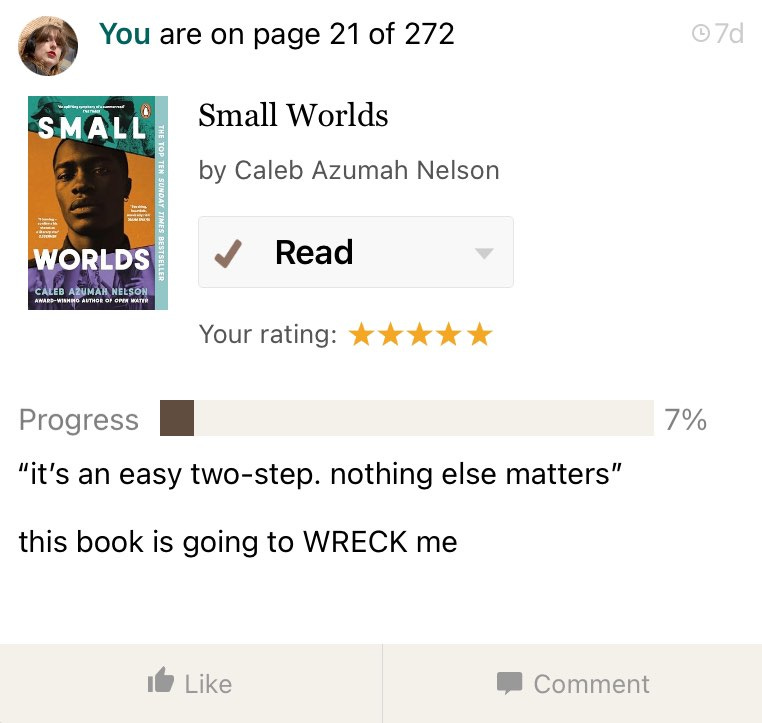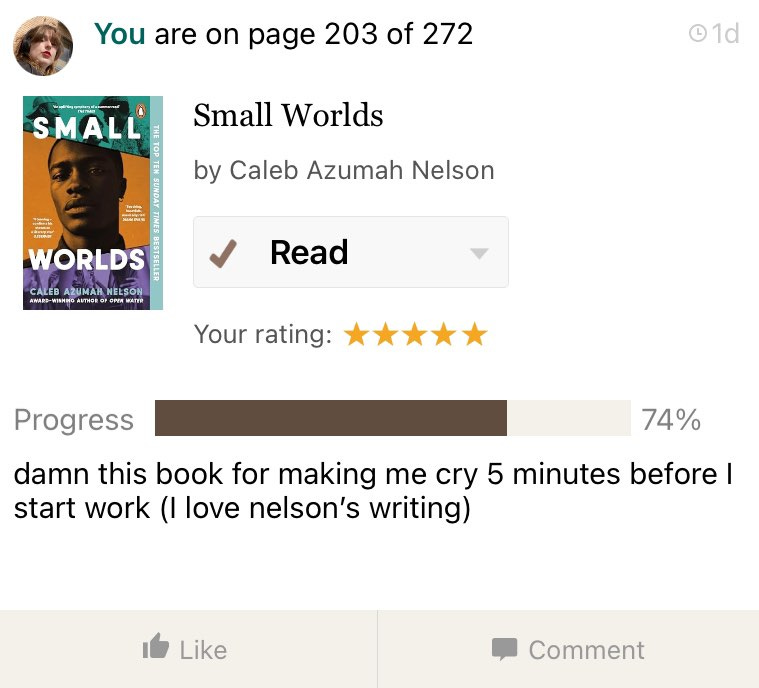Small Worlds (2023)
by caleb azumah nelson / space to feel, existing in spaces, narratives and in the people around us
Things have gotten better since we last spoke. Although it feels well over a month I last confessed to you, two weeks have barely passed by.
Since I finished reading Open Water by Caleb Azumah Nelson, I have thought of little else in terms of literature. I do not remember the ins and outs of every plot point, every line of dialogue, every punctuation mark. What I do remember is the way I felt, the push-pull of the characters and thinking ‘what they have is true love’. Not in the way of fairytales or the diluted Disney version; no, I mean real, true love. Love that is hard. Love that prevails.
Please note: this will continue spoilers to Caleb Azumah Nelson’s second novel Small Worlds. If you haven’t yet read it, I recommend you do before you continue. Bookmark me. Come back to me. I’ll be here waiting. But who am I to tell you what to do?
Small Worlds was just as emotive as I was anticipating it to be, perhaps even more. I knew what I was getting into having recently finished Open Water: well written characters that don’t feel fictional at all, heartstrings being tugged, brilliant prose. There is something so personal about his writing and his characters that make them alive on the paper. Nelson doesn’t particularly use purple prose and yet I know exactly who these characters are, what hardships they have faced and who they are trying to become. Why would he? Why would he construct all of these waving complex sentences when he can convey what he wants you to feel more effectively with just seven words? That is one of the beautiful things about his Small Worlds, and Open Water too. I feel like I know these characters intimately. I want to be known this intimately.
In these past couple of months, I have noticed a change in my reading taste. Reading Open Water marked the beginning of this change. I am letting go of reading for escapism, as coping mechanism; this included lots of young adult, high fantasy and very tropey narratives that I was reading because of trends and not because of genuine interest. Though I am not totally abandoning my roots of fanfiction and YA (I do enjoy a good YA fantasy as a pallet cleanser every now and then), my taste has definitely matured. I often find YA prose juvenal and lacking in complexity; in the past, when I was a fair few years younger, I blamed this on the writing. But maybe it’s me. This time it is, at least.
Now, I am searching for real stories. I am aware of how this sounds and I am in no way disregarding YA literature. I am no longer reading to escape, I am reading to live. The more I write these thoughts as they flow, the more I think that this might be my person’s solution for loneliness. Maybe? I don’t know. I think that sounded better in my head. But that might be because I’m scared to determine whether its true or not. I yearn for the heat of another body, not making the best decisions but still being loved anyways and hearing the outrageously loud laughs of my friends as we sit around drink alcohol and play boardgames. Stephen, the protagonist of Small Worlds, experiences something similar when he is kicked out of his home by his parents for dropping out of university. His whole world shatters because he is no longer permitted to live in it. His time has run out. Maybe Stephen and I are alike in that matter: you don’t realise what you have until its gone.
Yet I still prefer Open Water. It is a love story for the most part, despite sharing similar themes with Small Worlds. Identity, art, interpersonal relationships, living for and because of your art, racial identity, what it means to exist, bodies and spaces, both within and surrounding. Open Water felt natural, whereas Small Worlds felt forced. This article proclaims that he wrote Small Worlds in three months and unfortunately, you can tell. Kind of. It has less of the electricity his debut has so I was certain I was going to award it four stars. Good, very good, something I want to revisit, perhaps, one day.
And then his mam dies. Stephen loses what initially feels like the last connection to his family home and his childhood. His mam was there for him even after he was kicked out of his house. It was her who rung him every day, and if she couldn’t, she left a voicemail. It was her who didn’t turn her back when Stephen needed comfort and guidance the most. His mam was the stable figure in his life. Though I’m fortunate to not experience major loss in my life thus far, I feel like it is impending. I sense it on the horizon and I have let its threat crumble my resolve. I am at a point in my life where big decisions have to be made and losing everything is a possibility that I am scared of prophesising true. So when Stephen loses his mam to a heart attack, when he has finally found his feet again, when he isn’t consumed by negativity, I experienced this loss with him.
I was not planning on writing a full review (despite it well and truly deserving one) until I saw an advertisement on my way to work, one day.
Mind you, the National Trust has nothing to do with anything in Small Worlds. The words Space to feel reckoned with me so much then and there that I simply could not. Stephen and I, separated by paper and ink and joined by this narrative, created space for us to feel what we have been bottling up for longer than we want to admit. I allowed myself to feel through Stephen, through Nelson’s writing.
The book was a blur before this. I was simply reading, enjoying. But now I was feeling. This is what I was missing and what I enjoyed about Open Water.
After his mam passes, Stephen still goes to Ghana, just as him and his mam were planning to weeks prior. He visits Aunties and Uncles and cousins and completes the itinerary he was supposed to tick off with his mam. Her absence and the space she left allows Stephen and his dad to rekindle. The novel concludes with Stephen recounting his father’s experiences coming of age and immigrating to London, what it gave and what it took. Nelson slips back into the second person, which almost feels nostalgic (if you have read Open Water, which is told entirely in second and makes Pops break out of the strict immigrant parent stereotype. He weaves the lessons learned from such to help lessen the gaping space between them. Father and son.
I am going to conclude this review/ramble/personal essay (???) with the final lines from the novel. It sums up what I am trying to say better.
“Soft summer light graces his crown as he shakes his head, almost disbelieving of this moment, asking, what would we be if we always had this kind of space? And I tell him, in the quietness of the moment which falls, what I know, what I feel in the moment: free.”
Caleb Azumah Nelson, Small Worlds, p. 256.
I finished reading Small Worlds before work Saturday morning and I needed time to think. Generally. About this piece of literature. About the way it made me feel. About the way it continues to make me feel. Writing this has resurfaced those emotions. I am reading Giovanni’s Room by James Baldwin and I am one chapter in and maybe this will be a substitute until Nelson writes and publishes something new. Maybe it will burrow and make its own home within me. Who knows?







